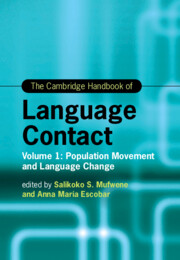Book contents
- The Cambridge Handbook of Language Contact
- Cambridge Handbooks in Language and Linguistics
- The Cambridge Handbook of Language Contact
- Copyright page
- Contents
- Maps Volume I
- Figures Volume I
- Tables Volume I
- Contributors
- Preface
- Introduction
- Part One Language Contact and Genetic Linguistics
- Part Two Linguistic Areas
- Part Three Language Spread
- Part Four Emergence and Spread of Some European Languages
- Part Five Language Diasporas
- 19 Diasporas: An Overview
- 20 Labor Migrations: Language Change in Communities and Diasporas
- 21 The Korean Diaspora
- 22 The Chinese Diaspora: Language Maintenance and Loss
- 23 The Diachrony of Yiddish and Judaeo-Spanish as Contact Languages
- Author Index
- Language Index
- Subject Index
- References
23 - The Diachrony of Yiddish and Judaeo-Spanish as Contact Languages
from Part Five - Language Diasporas
Published online by Cambridge University Press: 02 June 2022
- The Cambridge Handbook of Language Contact
- Cambridge Handbooks in Language and Linguistics
- The Cambridge Handbook of Language Contact
- Copyright page
- Contents
- Maps Volume I
- Figures Volume I
- Tables Volume I
- Contributors
- Preface
- Introduction
- Part One Language Contact and Genetic Linguistics
- Part Two Linguistic Areas
- Part Three Language Spread
- Part Four Emergence and Spread of Some European Languages
- Part Five Language Diasporas
- 19 Diasporas: An Overview
- 20 Labor Migrations: Language Change in Communities and Diasporas
- 21 The Korean Diaspora
- 22 The Chinese Diaspora: Language Maintenance and Loss
- 23 The Diachrony of Yiddish and Judaeo-Spanish as Contact Languages
- Author Index
- Language Index
- Subject Index
- References
Summary
This chapter discusses – in the general problematics of languages in contact – Jewish languages and languages of the Diaspora. It intends to study from a comparative perspective especially the diachrony of Yiddish and Judeo-Spanish, two diasporic languages with similar developments and destinies. After a short presentation of the two languages, we examine successively: 1) the creation of Judaeo-languages in Diaspora, 2) the Diaspora versus migration, 3) the Judaeo-calque languages, 4) the common dynamics of Jewish languages, and 5) the diachrony of Jewish languages. The conclusion focuses on the successful innovations appearing in a Jewish language. It points out the important role of the Hebrew component (its direct and indirect influence), as well as the broad interlinguistic competence of Yiddish and Judaeo-Spanish speakers in the process of evolution of the languages considered.
Keywords
- Type
- Chapter
- Information
- The Cambridge Handbook of Language ContactVolume 1: Population Movement and Language Change, pp. 716 - 745Publisher: Cambridge University PressPrint publication year: 2022

